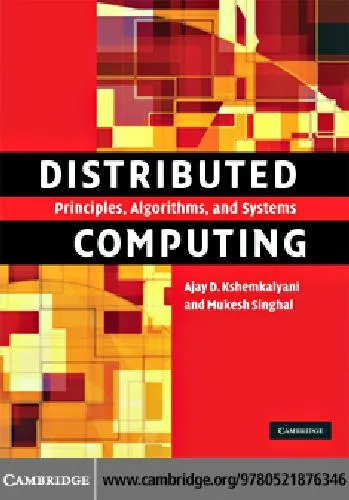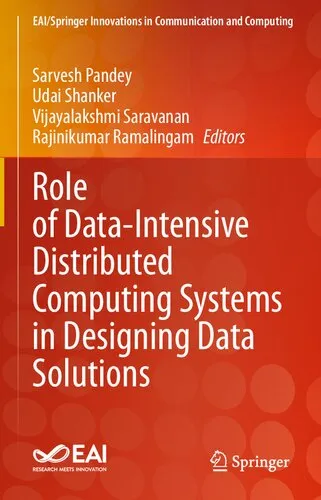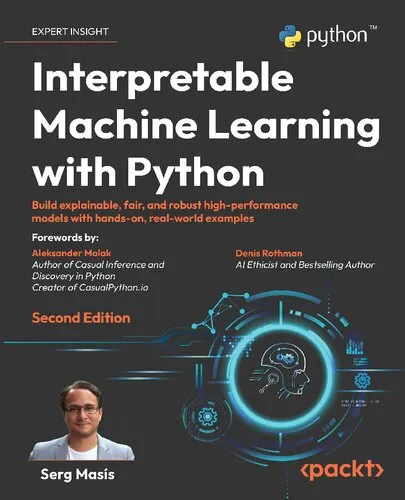Cambridge Distributed Computing Principles Algorithms and Systems
4.4
Reviews from our users

You Can Ask your questions from this book's AI after Login
Each download or ask from book AI costs 2 points. To earn more free points, please visit the Points Guide Page and complete some valuable actions.Related Refrences:
Introduction to 'Cambridge Distributed Computing: Principles, Algorithms, and Systems'
Distributed computing lies at the very heart of technological advancement in today's interconnected world. The book ‘Cambridge Distributed Computing: Principles, Algorithms, and Systems’ is a comprehensive guide designed to provide an in-depth understanding of distributed systems, the algorithms that run them, and the principles that govern their design and operation. Whether you're a student, a researcher, or an industry professional, this book equips you with the theoretical and practical knowledge necessary to thrive in the field of distributed computing.
Written to bridge the gap between the theoretical foundations and real-world applications, this book is structured to cater to a wide audience. It delves deeply into the core principles of distributed systems, covering critical aspects like consistency, fault tolerance, synchronization, and scalability. Layered with a plethora of algorithms, illustrative use cases, and modern practical applications, this book provides a roadmap to understanding the nuances of developing robust and efficient distributed systems. Let us explore what this book offers in detail.
Detailed Summary of the Book
This book is structured into three major parts: principles, algorithms, and systems.
The Principles section lays a solid foundation for understanding distributed computing. Topics such as distributed architecture models, failure handling, distributed coordination, and the CAP theorem are explained with clarity. These core principles guide the reader through the challenges and opportunities in the design and operation of distributed systems.
The next part focuses on Algorithms, providing a detailed exploration of the algorithms that underpin the functionality of distributed systems. Starting from basic communication protocols, the book covers distributed algorithms for leader election, consensus (like Paxos and Raft), distributed transactions, and replication strategies. Attention is also given to time synchronization, vector clocks, and gossip-based dissemination algorithms.
Finally, the Systems section examines practical implementations of distributed systems from real-world industry environments. Case studies include systems such as Apache Kafka for streaming, Hadoop for batch processing, and blockchain systems for decentralized computing. This part connects theoretical concepts with tangible applications that readers can directly relate to their own work or studies.
Spanning over numerous carefully curated chapters, this book not only educates but also inspires the reader to explore distributed computing in-depth while keeping real-world implications in mind.
Key Takeaways
- A clear understanding of the fundamental principles of distributed computing, including consistency, scalability, and fault tolerance.
- Mastery of distributed algorithms, with step-by-step explanations of consensus, synchronization, and coordination mechanisms.
- Insights into modern distributed systems and their architectures, including cutting-edge technologies like blockchain, distributed databases, and cloud-based systems.
- A balanced mix of theory and practice designed to prepare readers for both academic research and practical implementation in the technology industry.
Famous Quotes From The Book
"Consistency, availability, and partition tolerance cannot all be achieved simultaneously in a distributed system. Trade-offs, not perfection, are the key to real-world design."
"A well-designed distributed system is one that handles failure gracefully, because failure is not an exception; it's an inevitability."
"Understanding the interplay between distributed algorithms and system reliability is the essence of building robust, scalable systems."
Why This Book Matters
In an era driven by global connectivity, the importance of distributed computing cannot be overstated. From cloud services powering organizations to peer-to-peer networks revolutionizing finance and data sharing, distributed systems form the backbone of technology. This book stands out because it doesn’t just teach the fundamentals – it links those concepts to the challenges faced in designing modern systems, keeping performance, security, and scalability in mind.
For students and researchers, this book lays a foundation for exploring advanced topics in distributed computing. For industry professionals, it serves as both a reference guide and an inspiration to design systems that can handle the complexity and demands of the modern world. The integration of algorithms and real-world case studies ensures that every reader, regardless of their background, finds value in its content.
Above all, this book matters because understanding distributed systems is no longer optional – it’s essential for those contributing to the future of technology. With clear explanations, balanced discussions, and practical insights, ‘Cambridge Distributed Computing: Principles, Algorithms, and Systems’ is truly a landmark volume in the field.
Whether you're at the start of your journey into distributed computing or seeking to deepen your expertise, this book offers a comprehensive, engaging, and thoughtful approach to one of the most important technological disciplines of our time.
Free Direct Download
You Can Download this book after Login
Accessing books through legal platforms and public libraries not only supports the rights of authors and publishers but also contributes to the sustainability of reading culture. Before downloading, please take a moment to consider these options.
Find this book on other platforms:
WorldCat helps you find books in libraries worldwide.
See ratings, reviews, and discussions on Goodreads.
Find and buy rare or used books on AbeBooks.
1291
بازدید4.4
امتیاز0
نظر98%
رضایتReviews:
4.4
Based on 0 users review
Questions & Answers
Ask questions about this book or help others by answering
No questions yet. Be the first to ask!






![The Ultimate iOS Interview Playbook: Conquer Swift, frameworks, design patterns, and app architecture [Team-IRA]](https://s3.refhub.ir/images/thumb/The_Ultimate_iOS_Interview_Playbook__Conquer__29925.webp)







